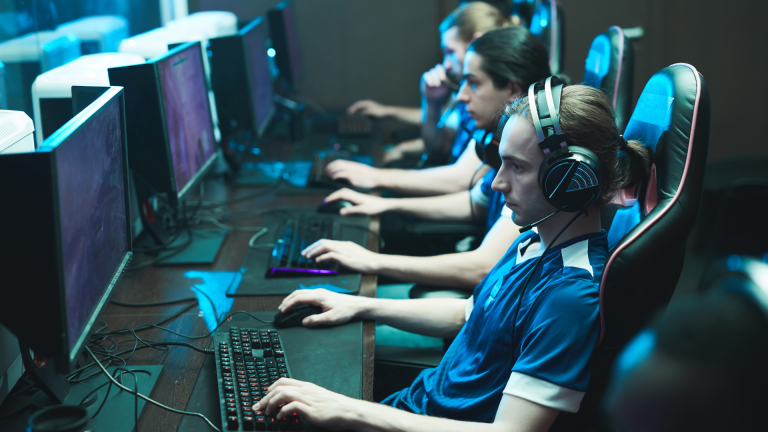Excessive online gaming is when a person plays digital games for more than 30 hours a week, or 6-8 hours per day, which may interfere with other life activities. The health risks of excessive online gaming include sleep deprivation, obesity, and mental health symptoms, such as anxiety, depression, and ADHD.
Risks of Excessive Online Gaming Sessions
Gaming has become a massive pastime among young people. In fact, some studies have even shown increased levels of addiction among gamers. The trouble comes when you spend excessive amounts of time playing online games. The amount of time spent with video games has increased exponentially over the past few years, and there are many reasons why. And here are many risks that you could get from excessive online gaming sessions.
- Musculoskeletal problems
Playing video games is a harmless way to pass the time, but there’s concern that too much online gaming might be tough on your body. When you’re gaming online, you’re usually sitting still, not getting much physical activity. This can lead to extra body fat, which is linked to muscle issues, like weaker or injured muscles, and a higher risk of diabetes. If you’re a gamer dealing with these issues, don’t worry-there are ways to handle it. One way to deal with them is by taking regular breaks and doing relaxing activities, like getting a massage. You can find a nearby spa by searching online with terms like “massage near me” and then book yourself a session where you will likely get a massage of your musculoskeletal system. Besides, there are other ways like stretching and yoga to deal with these muscle and skeletal problems that you might face.
- Vision issues
Excessive gaming can lead to serious eye problems. From increased sensitivity to glare, loss of peripheral vision, and reduced depth perception, gaming can damage the eyes and hamper vision. This is why it’s important to take breaks from gaming. If your eyes are feeling strained and tired, take a break to do something else.
- Obesity and overweight
Online gaming is here to stay. The convenience and accessibility are undeniable, but the drawbacks are just as real. A study published by JAMA Network Open in 2017 found an association between excessive gaming and obesity. Technology and health experts generally agree that excessive gaming can cause negative consequences on health and result in weight gain. What’s more, prolonged gaming habits can even lead to a decrease in testosterone levels, resulting in fatigue, low libido, and erectile dysfunction. In such cases, seeking professional help through options like TRT North Liberty or nearby areas may be necessary to restore optimal testosterone levels. By undergoing testosterone replacement therapy and addressing hormonal imbalances, individuals can regain their vitality and overall well-being. However, a balanced approach is key. Incorporating regular physical activities alongside online gaming can help mitigate the potential health risks and promote a healthier lifestyle. Further, obesity can lead to a different set of diseases such as heart disease among others. For this purpose, you may want to include plenty of fruits and vegetables in your diet and cut down on sugary and processed foods. Additionally, you might limit alcohol consumption and quit smoking to reduce the risk of heart disease. If you experience symptoms such as chest pain frequently or have a BMI greater than 30, you can reach out to cardiologists in Milford, PA or elsewhere. These professionals can assess your condition and evaluate for cardiovascular risks.
- Seizures (Epileptic)
Excessive internet gaming sessions can cause seizures. Also known as epileptic seizures, these seizures are a type of epileptic disorder. These seizures can be mild or can severely affect a person’s behavior. A person who experiences seizures cannot control their movements and can experience a loss of consciousness. Furthermore, seizures can be a symptom of an underlying mental health disorder, such as depression.
- Security issues
Spending a lot of time can make an individual more exposed to cyber-security threats. They might attract malicious bots or hackers because of a lack of awareness on how to maintain online safety. Going through F5’s bots glossary (or something similar) would be a good idea to find out the different types of bots, and might also provide some insight into how to navigate these risks and reduce the likelihood of a data breach.
- Social disconnection
Online gaming is big business, and with it comes big risks. The amount of time young people spend playing video games and the number of activities they engage in online surpass the hours they spend interacting with their peers in person. When that disconnect occurs, the risk of online social disconnection rises.
- Poor academic or professional performance
Excessive online gaming sometimes leads to poor academic or professional performance. These effects appear more in children and adolescents and can be attributed to several reasons such as negative emotional, cognitive, and physiological outcomes.
- Exposure to toxic gaming environments
While the gaming community tends to disagree on the relative merits of violent video games versus non-violent ones, there is general agreement that gaming is not healthy for children and adolescents. More researchers are showing that exposure to such video games can negatively impact kids’ behavior, impulse control, and social skills. The American Academy of Pediatrics reached that conclusion in 2010, and further research has backed up that warning.
Most people are proud of their gaming skills. In fact, they’re so proud of the gaming skills they’re often tempted to let their gaming skills take over their lives. Playing video games all day, every day, can get to the point where it’s interfering with everything else, especially if it’s interfering with work, school, friends, or family. So, the above articles talk about the dangers of excessive gaming in the hope that it will help you.







Recent Comments